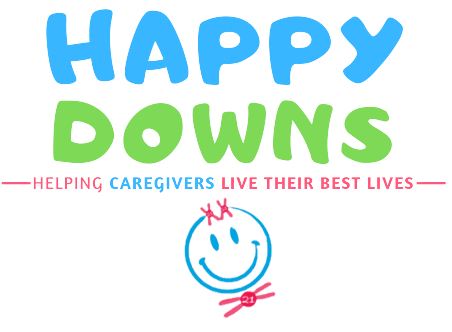Imagine trying to figure out your own life…and doing poorly at this. Imagine you are desperately seeking to determine what you need to do now, to ensure that you are not weeping later. Now, imagine doing all of that not just for yourself, but for your loved one who has Down’s Syndrome. Wait…you don’t have to imagine…this is already your life. You are all too familiar with the many sleepless nights due to worry…worry about the care that your loved one will receive when you are gone. Who is going to love them like you? Who is going to ensure that they eat, have somewhere to sleep and have proper healthcare?
You are also familiar with the importance of planning ahead, but you are yet to take the first step. It all seems so daunting. Let’s face it, future planning is just plain hard. It has been the bane of the existence of far too many family caregivers to count. It is overwhelming and downright stressful. And then, who has the time for planning for the future? Between doctor’s visits, battling the school system for a merely decent education for your loved one, and then fighting to find them employment…it is just one struggle after the other…who in the world has time to even think about the future, much less plan it?
We know that as a family caregiver, you sometimes don’t even have the time to take a bathroom break, BUT we are here to help you and we believe that if you start where you are and take small steps, you will eventually see some progress. Having a plan is one thing, whilst having a successful plan is another. Thus, the earlier you start, the better, BUT it is never too late to start. We believe that it is better to do little than do nothing!
So, as you start your journey in planning ahead, we suggest that you employ the following 3 tips for a successful future:
1. Include Your Loved One who has Down’s Syndrome
Whose future are you planning? That’s right, your loved one who has Down’s Syndrome. Therefore, it makes sense to include them in the planning process. Yes, we know that some of our loved ones may have difficulty communicating their desires or dreams to us…it may take having 5 different conversations over the span of 5 weeks, just to discuss one point. But, it is worth the effort, as it is extremely important that you loved one sees that their input is valued, especially as they become adults. Every person with Down’s Syndrome is different and therefore, the approach to start the conversation has to be different for each family. But, the conversation can and must be started.
In addition, a lot of the information gathering will come from interacting with your loved one over the years and taking note of their likes, dislikes, requests and just their general behavior and comments. This is why documenting key information is so important for family caregivers. We recommend that you have what we call a Caregiver Guide, which has all important information pertaining to your loved one and which can be easily passed on from one caregiver to the next.
So, start the conversation with your loved one today and take those notes!
2. Document Everything
Speaking of taking notes, we here at HappyDowns wholeheartedly believe that family caregivers should document everything. We cannot stress the importance of having all important information in a form that is easy to follow and easy to pass on from one caregiver to the next.
Whatever has to do with your loved one’s future, i.e. the information coming out of the discussions you’ve been having with your loved one, information about your loved one that has to do with their health (e.g. medications, past and present), financial stuff, e.g. if your loved one has any bank accounts OR how your loved one will receive money once you have passed on, whatever it is…all this information must be documented and be easily accessible to the relevant persons.
In your documentation journey, we recommend that you start with two tools:
- The Caregiver Guide
This tool documents all important information pertaining to your loved one who has Down’s Syndrome, e.g. the living arrangements, social activities, all relevant financial information, etc. You can have a book or folder in which you write these things down. Ensure that you update the information in this guide in a timely manner, as you want to ensure that only accurate and current information is passed on.
- The Important Documents Checklist
This tool lists all important documents of the primary caregiver, along with their locations. Can you imagine if you passed away suddenly and your family members who are devastated, heartbroken and just sick with grief, had to be running up and down, playing detective and trying to figure out if you had any important documents and where in the world you hid them? That is just plain unnecessary stress for your family. That is why we are offering you the Important Documents Checklist for FREE. Just sign up HERE (please check your email after you have signed up).
We implore you to use this tool. Take 5 minutes today and start filling out this checklist…your family will be grateful.
3. Test the Plan While You Are Still Alive
What could be better than making a plan for your loved one who has Down’s Syndrome and then actually putting that plan into action now to see if it works or not? Imagine there’s a single mom who has three children…the youngest has Down’s Syndrome. Her eldest child has agreed to take over as primary caregiver once the mom has passed on. The mom is now in her sixties, her eldest in her late thirties and the youngest is twenty-five.
Wouldn’t it be brilliant to start, from now, to put their plan into action…a little at a time? Wouldn’t it be great to have the youngest child start spending the weekends with her eldest sibling, probably once a month (just to start and get a feel of the new surroundings)? Compare this to the shock that the person with Down’s Syndrome would feel if one day she woke up and her mom was no longer around and then in the chaos of things, she was dragged off to go live with her oldest sibling in a strange home in a strange neighborhood.
If you have put in the hard work to create a future plan, then please test this plan while you are still alive. See what works and what does not. Maybe you will have to go back to the drawing board, maybe not. Give yourself time to fix what you can. Give yourself time to truly put the best plan in place for the people you love.
START Planning Now!
The best time is right now. Remember, we are not asking you to leap tall buildings in a single bound. Start where you are and take small steps. It’s about progress, not perfection.
We send hugs to you and your family. We wish the brightest of futures for you all!



